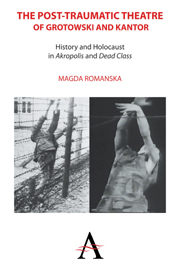 The Post-traumatic Theatre of Grotowski and Kantor
The Post-traumatic Theatre of Grotowski and Kantor Book contents
- Frontmatter
- Contents
- Foreword by Kathleen Cioffi
- Preface
- Acknowledgments
- List of Illustrations
- Introduction
- Part I Our Auschwitz: Grotowski's Akropolis
- Chapter 1 Jerzy Grotowski: A Very Short Introduction
- Chapter 2 Native Son: Grotowski in Poland
- Chapter 3 Grotowski: The Polish Context
- Chapter 4 Grotowski, the Messiah: Coming to America
- Chapter 5 The Making of an Aura
- Chapter 6 On Not Knowing Polish
- Chapter 7 “In Poland: That is to Say, Nowhere”
- Chapter 8 Akropolis/Necropolis
- Chapter 9 The Vision and the Symbol
- Chapter 10 “This Drama as Drama Cannot Be Staged”
- Chapter 11 Two National Sacrums
- Chapter 12 “Hollow Sneering Laughter”: Mourning the Columbuses
- Chapter 13 Against Heroics
- Chapter 14 Representing the Unrepresentable
- Chapter 15 Trip to the Museum
- Chapter 16 Bearing the Unbearable
- Chapter 17 The Living and the Dead
- Chapter 18 Jacob's Burden
- Chapter 19 The Final Descent
- Chapter 20 Textual Transpositions
- Chapter 21 Akropolis After Grotowski
- Part II Our Memory: Kantor's Dead Class
- Postscript
- Appendix
- Notes
- Bibliography
- Index
Chapter 1 - Jerzy Grotowski: A Very Short Introduction
from Part I - Our Auschwitz: Grotowski's Akropolis
- Frontmatter
- Contents
- Foreword by Kathleen Cioffi
- Preface
- Acknowledgments
- List of Illustrations
- Introduction
- Part I Our Auschwitz: Grotowski's Akropolis
- Chapter 1 Jerzy Grotowski: A Very Short Introduction
- Chapter 2 Native Son: Grotowski in Poland
- Chapter 3 Grotowski: The Polish Context
- Chapter 4 Grotowski, the Messiah: Coming to America
- Chapter 5 The Making of an Aura
- Chapter 6 On Not Knowing Polish
- Chapter 7 “In Poland: That is to Say, Nowhere”
- Chapter 8 Akropolis/Necropolis
- Chapter 9 The Vision and the Symbol
- Chapter 10 “This Drama as Drama Cannot Be Staged”
- Chapter 11 Two National Sacrums
- Chapter 12 “Hollow Sneering Laughter”: Mourning the Columbuses
- Chapter 13 Against Heroics
- Chapter 14 Representing the Unrepresentable
- Chapter 15 Trip to the Museum
- Chapter 16 Bearing the Unbearable
- Chapter 17 The Living and the Dead
- Chapter 18 Jacob's Burden
- Chapter 19 The Final Descent
- Chapter 20 Textual Transpositions
- Chapter 21 Akropolis After Grotowski
- Part II Our Memory: Kantor's Dead Class
- Postscript
- Appendix
- Notes
- Bibliography
- Index
Summary
Born in 1933, Jerzy Grotowski graduated with a degree in acting from the State School of Theatre in Cracow. He went on to pursue directing at the Lunacharsky Institute of Theatre Arts (GITIS) in Moscow, where he studied the acting and directing techniques of Stanislavsky, Vakhtangov, Meyerhold, and Tairov. After returning to Poland, Grotowski began working as a teaching assistant at the Theatre School in Cracow. He continued to study directing, and the year 1957 marked his directing debut with a production of Eugene Ionesco's The Chairs. In 1958, Grotowski directed a workshop production of Prosper Merimee's The Devil Made a Woman, and a production of A Jinxed Family by Jerzy Kszysztoń, a troubled and relatively unknown Polish playwright. Conceptualizing this early production, Grotowski not only changed the title to the Gods of Rain, but weaved in a number of other poetic and film texts, including lines from Polish poets and Shakespeare's Hamlet, as well as texts from contemporaneous media, such as newspaper articles. During those early theatrical experiments, Grotowski was interested in developing a unique directorial relationship to the script. An interview conducted on account of the opening of the Gods of Rain is one of the first records of Grotowski's emerging views on directing: “As far as the director's relationship to the dramatic text goes,” Grotowski says, “I believe the text should only serve as a theme for the director, on the basis on which he should construct a brand new work of art, his spectacle.”
- Type
- Chapter
- Information
- The Post-traumatic Theatre of Grotowski and KantorHistory and Holocaust in 'Akropolis' and 'Dead Class', pp. 49 - 56Publisher: Anthem PressPrint publication year: 2012
